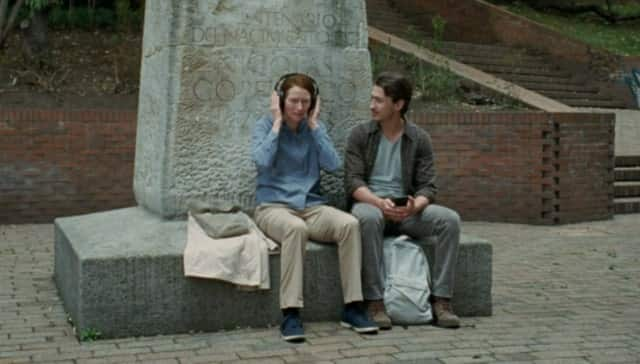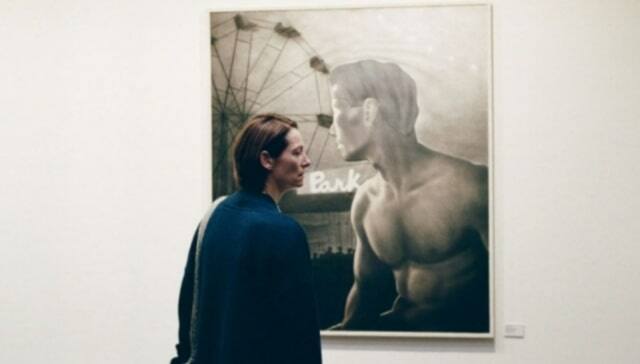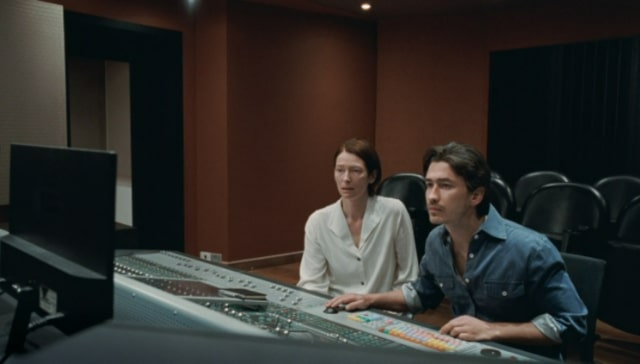Often all it takes is a scare, a car chase, a musical number or a meet-cute for a movie to forever be etched in our memories. The moment may be an image you can’t shake off or a whole sequence of them. This series will profile such immortal moments that encapsulate the essence of a movie, a genre and the medium itself. From the whistling of windows to the rattling of pipes to the things that go bump in the night, the world around us rings with all sorts of strange sounds, some more mysterious than others. The mystery comes from sound waves being invisible to our eyes when they travel through the air. To see sound requires the waves to travel through a medium we can see. But what if the mystery extends to not being able to even discern a visible source? How will the auditory modality influence visual modality? After all, the sounds we hear are often described in visual and tactile terms. Defining a sound of indeterminate origin, how it modulates visual perception, and the mechanisms governing crossmodal interactions are the focus of a deconstruction and reconstruction scene in Apichatpong Weerasethakul ’s _Memoria_ . Indeterminacies are par for the course in the cinematic realms of the Thai auteur. And so they are in his new lucid dream of a film. Tilda Swinton plays Jessica Holland, a British expat living in Colombia, who suffers from a tropical malady of sorts. At the break of day, she is woken up by an explosive thud, a most unsettling wake-up call which recurs at random intervals and reverberates in her head. The idea was inspired from Weerasethakul’s own experiences with a sleep disorder, known as exploding head syndrome, characterised by the perception of a loud noise only those who suffer from it can hear. The disorienting thud goads Jessica into an existential odyssey, as she goes searching for the source across the cityscapes and jungles of Colombia. The sound propels the film towards a terrain, as familiar as unfamiliar for Weerasethakul fans, where myth and memory, mundanities and metaphysical mysteries exist side-by-side. [caption id=“attachment_11042251” align=“alignnone” width=“640”]  Jessica and Hernán in Memoria[/caption] Early in the journey to locate the source, Jessica realises the ontological challenge of describing an aural effect without a visual cause. In a remarkable scene, she visits a sound engineer named Hernán (Juan Pablo Urrego) at a recording studio to recreate the thud that plagues her. “Thud” or “bang” don’t cover it of course. “It’s like a big ball of concrete that falls into a metal well which is surrounded by seawater,” is how she first describes it. Hernán combs through an archive of sound effects to recreate it, adjusting the timbre, cutting and boosting frequencies with treble and bass controls. The result isn’t quite accurate. The thud is “more earthy” and its echo “more metallic,” she indicates. “It’s like a rumble from the core of the Earth.” Hernán makes more tweaks till they get it right. A sonograph on the computer screen offers us a graphic representation. But the end result is still only a digital approximation. The synaesthesia, the visceral reaction, and the sensation of arbitrariness are lost in translation. On each occurrence, the sound disorients Jessica and the viewer. The mysteries it teases are unfathomable in their entirety, much like the experience of watching the film itself. Through a single sound, Weerasethakul, shooting his first film outside his homeland, conveys the heightened sense of alienation and dislocation while navigating a foreign country. When the thud arrives, it arrives with the dull suddenness of a jump scare. The meditative quiet of the long static shots set our minds at rest, rendering us all the more exposed for the sonic disruption to come. The long static shots themselves bear the semblance of a living room, a space to lounge and submit to the film’s incantatory rhythms. Once attuned to its rhythms, time appears to stand still, directing our attention to every sound: from the hum of machinery to the rustle of leaves to the babble of a brook. As always, Weerasethakul encourages an emotional, intellectual, and spiritual engagement with his film. [caption id=“attachment_11042261” align=“alignnone” width=“640”]  Tilda Swinton as Jessica[/caption] The possible subterranean origins of the sound, as suggested by Jessica, charge the film’s exploration of a nation’s buried memories with shades of mourning. When Jessica meets the archaeologist ( Jeanne Balibar ), she learns of the skeletal ruins unearthed during a tunnel excavation. Colombia emerged from the colonial era only to endure multiple civil wars. The collective trauma still echoes deep in the national psyche, like a metallic thud. For what are memories if not ruins of the past echoing in the mind? The sound can thus be read as a symbol for the echo chamber of history. As George Santayana famously put it, “Those who cannot remember the past are condemned to repeat it.” Though it may seem like no one else but Jessica can hear the sound, Weerasethakul hints at the possibility of it being a trigger for unexplained phenomena around the city. Car alarms set off one by one in an urban symphony. A relative Jessica believed to be dead is in fact very much alive. The Hernán whom she met at the recording studio turns out to have never worked there in the following visit. When she wanders around the Colombian jungle, she meets an older man, also named Hernán (Elkin Diaz), who claims to remember everything. A vividly sensorial sequence, which sees both their memories bleed into each other, suggests Jessica may not have a malady, but an ability to hear things beyond the audible spectrum, like a human radio receiver. Memoria confuses yet captivates in the same manner as a waking dream. And in a film whose extended moments accumulate to provide an experience akin to meditation, the recording studio scene acts as a spiritual guide, instructing us on Weerasethakul’s ideas about sound, memory and perception. Moreover, what do the recreation of reality via technology and the rendering of an individual experience into distributable media describe if not the art and process of filmmaking itself? Memoria is streaming on MUBI. Video link to the opening moments of the scene:
Prahlad Srihari is a film and music writer based in Bengaluru. Read all the **_Latest News_** _,_ **_Trending News_** _,_ **_Cricket News_** _,_ **_Bollywood News_** _,_ **_India News_** and **_Entertainment News_** here. Follow us on Facebook_,_ Twitter and Instagram_._


)
)
)
)
)
)
)
)
)



